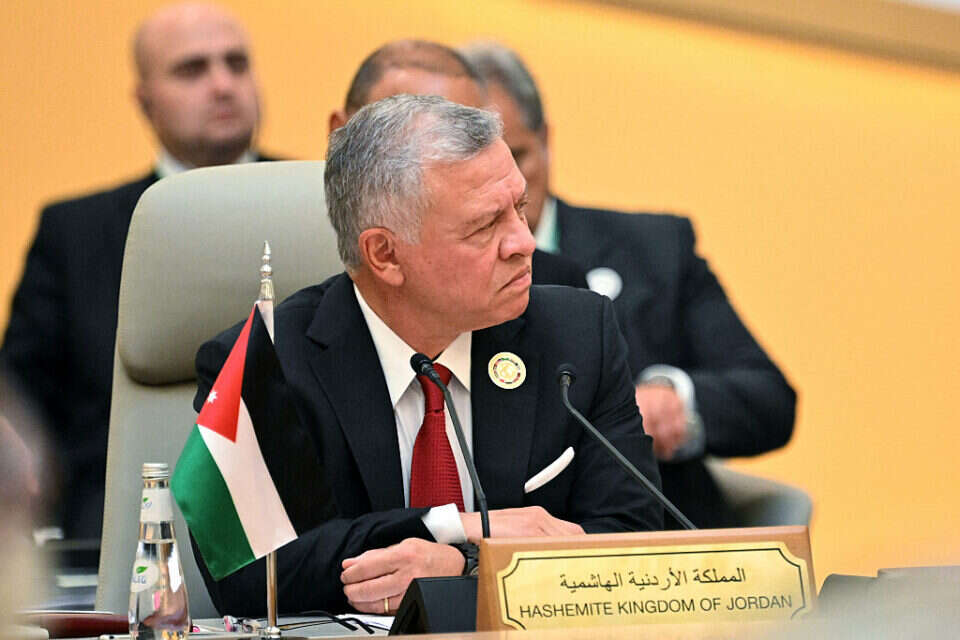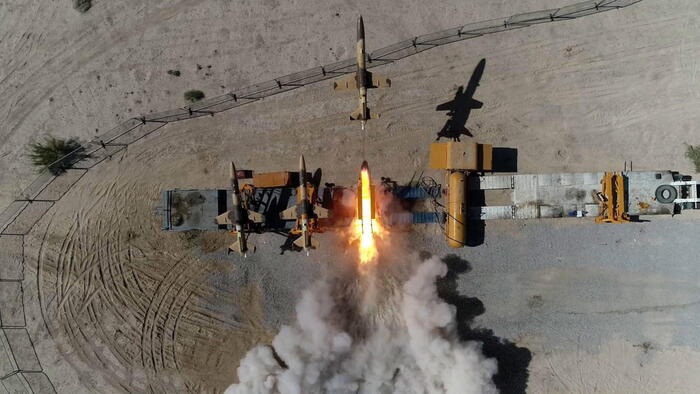Faced with an increasing Iranian threat - the king of Jordan needs Israel more than ever.
Not only because the border with it is the quietest, but also because, contrary to his statements about an "Arab military alliance", he understands that it is doubtful whether the US and Saudi Arabia are sufficiently committed to him.
Saudi crown prince Mohammed bin Salman is a vengeful man.
He proved this at the Jeddah summit when he chose to embarrass his guest Biden with leaks about their conversation about the assassination of Saudi journalist Jamal Khashoggi in 2018.
The media heard how bin Salman preached that the values of other countries should be respected.
And what is true for the leader of the free world - also applies to Abdullah.
In 2015, he refused to participate in the Arab coalition in the war in Yemen, and the prince remembers this well.
The disappointment from Biden
As for the US, like other Arab leaders at the Jeddah summit, Abdullah got the impression that the Americans do not intend to confront Iran. Accordingly, in an interview with a Jordanian newspaper, he stated that if Tehran changes its ways - there will be room for rapprochement.
Assad with Khamenei.
Jordan's headache, photo: AFP
"This is the line that was agreed upon in Jeddah," says Pinchas Anbari, a Middle East expert and senior researcher at the Jerusalem Center for Public and State Affairs.
"The Arab countries had a question for Biden: What are you going to do with Iran? Do you give up on it and want allies in the Arab world against it, or continue with the agreement (negotiations to return to the nuclear agreement; SHK). Biden did not give an answer, and they were disappointed. All the cold shoulder to Biden is because he didn't provide a decisive answer, even if they didn't believe. That's why the Arab countries returned to the political games. They see Iran as an enemy, but they don't pull the strings."
A message doomed to failure
Jordanian commentators list four Iranian threats, most of them potential: the infiltration of terrorist cells into the country's territory;
the intelligence cooperation created between Iranian militias, the drug smuggling networks and the Assad army in the Syrian border area;
Activating dormant terrorist cells inside Jordan;
and the phenomenon of "lone wolves", followers of the Iranian Shiite revolution who may act under its inspiration.
These are joined by mysterious cyber attacks, which are attributed to "countries and organizations".
Jordan struggles on the ground with the threat of smuggling.
Iran's goal is to flow weapons and drugs into the kingdom that will initially reach criminal gangs, but will later destabilize the government.
In this context, the former Jordanian Minister of Justice, Dr. Mahmoud Al-Kharbasha, recently explained that in addition to the border's mountainous terrain that facilitates smuggling, "after the departure of the Russian forces that were based on the northern border with Jordan, the space was filled by Shiite militias."
Smuggling on the Syrian border is nothing new.
Already at the beginning of the year it was reported that the Jordanian army is frequently involved in clashes with drug smugglers from Syria, so much so that in Amman they sent a message to the Assad regime in Damascus to take matters into their own hands.
It was doomed to fail, of course.
Assad's people, as mentioned, are part of the problem, and therefore the message is intended to prepare the ground for a change in the instructions to open fire at the border, so that anyone who crosses it will be subject to death.
However, a report that the Syrian Center for Human Rights published in June pointed to an increase in operations. Looking back, Colonel Jordani noted that in the last three years, infiltration and smuggling operations have doubled.
"The Jordanians see this as a strategic danger, who want to turn the Jordanian youth into drug addicts," explains Inbari.
"The Syrian units are smuggling huge amounts of drugs into Jordan. There is a reinforcement of the Jordanian army at the border to stop this drug smuggling, which includes drones - they transport drones with drugs and land them in Jordan.
"Look at the Tanzim in Jenin," adds Anbari.
"It's first of all criminal gangs, then Iran penetrated them through Salah Arori (deputy head of the political bureau in Hamas who is sitting abroad; Shak) and it is directed against the IDF.
This is despite the fact that the 'commercial interest' of the gangs is not to confront the IDF, otherwise how will they do business. This model also applies to Jordan. The weapons also go to criminal gangs, from which (Iran; SHAK) will later challenge Jordanian security.
Really a Janine model."
the Israeli interest
Iran has at least two interests in destabilizing Jordan.
The first is related to the imperialist ambitions of the Islamic Republic.
The second is to pave an arms smuggling route for terrorist elements who identify with it in the Yash, mainly Islamic Jihad operatives. So Israel also has a desire to help Abdullah.
Despite the common interests, in his words about a regional Arab alliance, King Abdullah was careful not to mention Israel and took care to qualify himself.
Despite the recent meeting with Prime Minister Lapid in Amman, Shalit has internal concerns that he cannot ignore. The main one is of course the large Palestinian population that makes up half of the total population.
However, their presence not only prevents a real rapprochement with Israel but also arouses anger among the Bedouin tribes in Jordan.
"Over the years, many Palestinians came. They were rejected by the government and the security agencies - and turned to business. At first they were small merchants and later they became rich. They also show off their wealth. In the meantime, the Jordanian official's salary has decreased and now it is difficult for him to support himself. At this time, the Palestinians are flourishing , swimming in money. They are the Jordanian economy," explains Anbari.
This is where the fear of a coup on the part of the royal family comes in.
As you may recall, Abdullah's half-brother, Hamza, was placed under house arrest in 2021.
Later he renounced his noble title in protest.
The reason for the arrest was fear of a coup in light of the support that Hamza received from some of the Bedouin tribes, who used to be the Jordanian elite and are now frustrated by the flourishing of some Palestinians.
Prime Minister Lapid with the King of Jordan at their last meeting, photo: Haim Tzach/Leam
Alongside this, the country is also home to hundreds of thousands of Shiite refugees who poured into it from Iraq, from whom the fear of dormant cells and "lone wolves" probably originates.
It was precisely the weakening of one of Hamza's support bases that became Abdullah's headache.
"During the war in Syria, the tribes in the north were eroded. Their leaders fled Syria, and the border area that was under their control passed to the control of the Syrian army and the Iranians, who are also taking advantage of this for Shiite subversion," explains Anbari.
Against this background, he raises the possibility that there are dormant Hezbollah cells in Jordan, referring to the half million Shiites who arrived in the kingdom.
were we wrong
We will fix it!
If you found an error in the article, we would appreciate it if you shared it with us







